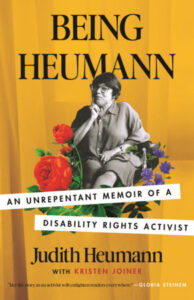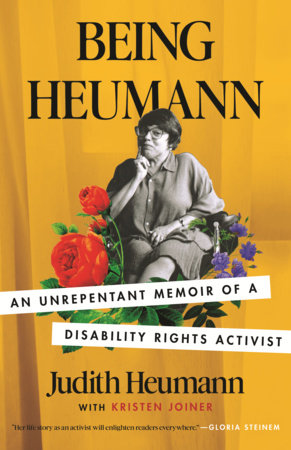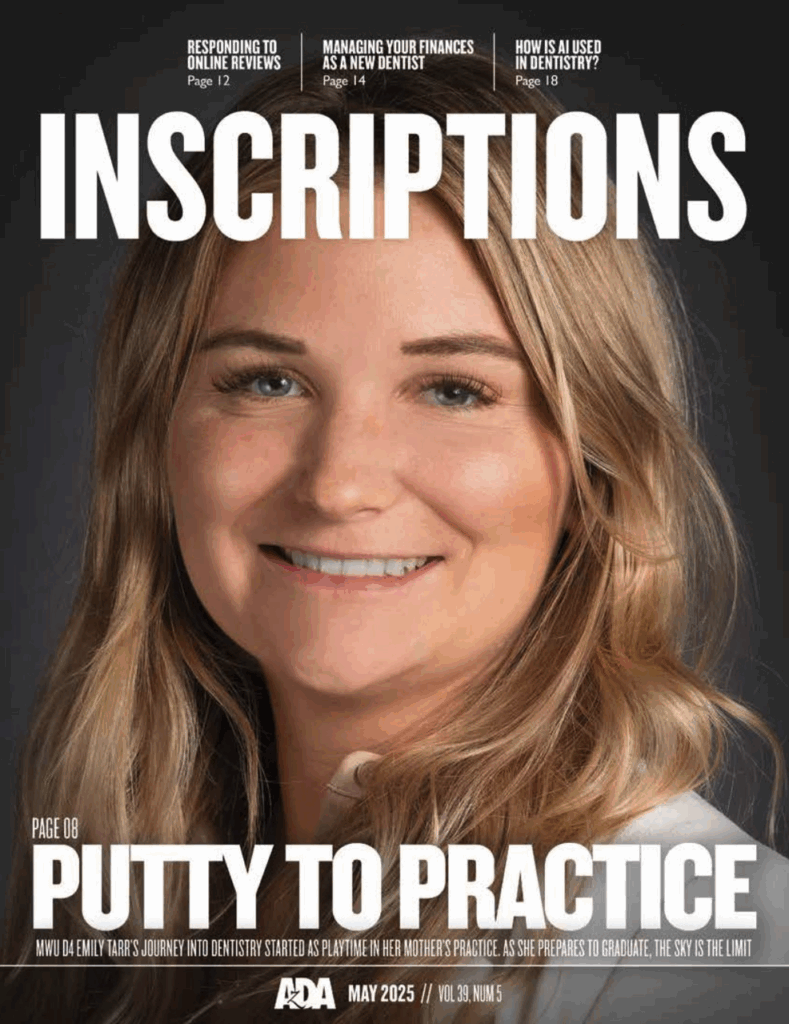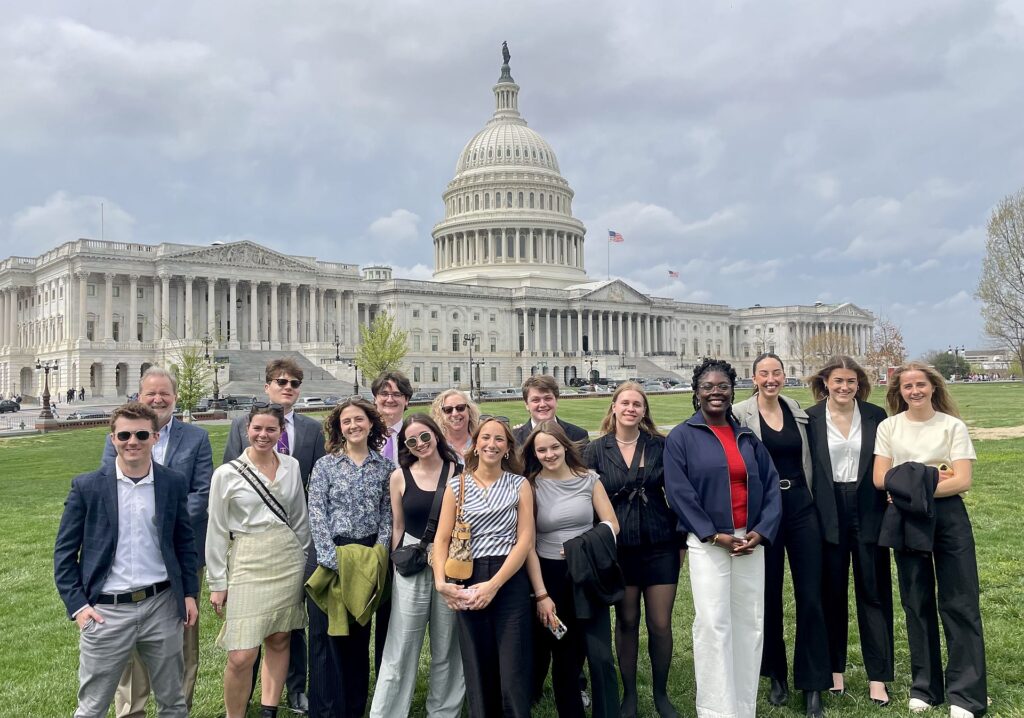Saint Michael’s first-year students to explore disability rights advocacy through Judith Heumann’s memoir
Each year, all incoming first-year students read the same book to provide a common basis for discussion, learning, and introduction to college across all First-Year Seminar courses. These texts often explore themes such as diversity, equity, and humanity, which can be discussed from a number of different academic disciplines and perspectives.
This upcoming academic year, the First-Year Seminar common text will be Being Heumann: An Unrepentant Memoir of a Disability Rights Activist by disability rights activist Judith Heumann (with Kristen Joiner). Heumann is one of the most influential disability rights activists in U.S. history, and in this memoir, she shares her journey as a disabled person who pushed for her right to receive an education, have a job, and be treated as a human.

Professor Peter Vantine.
Across the U.S., Heumann’s demonstrations were crucial to passing disability rights legislation. She also founded national and international disability advocacy organizations and held senior federal government positions. Heumann’s influence and impact on disability rights is enduring, which Saint Michael’s Professor Peter Vantine, Director of the First-Year Seminar Program, said was one of the things that drew in committee members who choose the common text.
“This book was one of the final choices last year, but not the one we picked. Going into this year, we seriously reconsidered it,” Vantine said.
He added, “When thinking about a common text, we wanted a book that can be thought about from a lot of different angles. A book where you could take a sociological approach, a scientific or a biological approach, a historical approach, a literary approach… courses should be interdisciplinary, and they should promote reflection on diversity.”
At the age of two, Heumann began to use a wheelchair because she contracted polio. From being denied the right to attend school because of being considered a “fire hazard” to doctors suggesting she could be institutionalized, Heumann faced numerous challenges from an early age. Still, her parents always supported her and fought for her rights.
“The book begins in a very striking way,” Vantine said. “For Judy Heumann’s parents, there was really no question that they wanted to have their daughter live as full of a life as she could. It is a striking opening where the author makes it clear that almost her very existence was a question for her doctor at that time, but never for her parents.”

The cover of Being Human, the Saint Michael’s College Common Text for 2024-25.
According to Vantine, this is the first time that the First-Year Seminar common text will be a memoir on disability.
“The broader topic of disability was on my mind because it had occurred to me that of the various topics touching on different forms of diversity that we’ve explored in the last decade, disability was not one that we had really squarely taken on,” Vantine said. He also mentioned the impact of the Saint Michael’s Students with Disabilities Advocacy Alliance (SDAA) group on increasing awareness around disability rights advocacy on campus.
In March last year, Heumann passed away at the age of 75. After her passing, SDAA held a memorial event for her in the lobby of Alliot where they honored her life and passed around slips of paper with things she had famously said, Vantine recalled. Most of the quotes were taken from her memoir.
“I think SDAA has done a lot to grow awareness of disability rights on campus, and it has concretely helped increase my own awareness as an individual,” Vantine said.
Every year, approximately three faculty or staff members are asked to write a short essay reflection providing different ideas, perspectives, and avenues to the text. These essays are shared with first-year students and also serve as examples of thoughtful writing about the book. This year, Professor Patrick Standen from the Philosophy and Ethics Department will write one of the essays. Standen teaches several classes at Saint Michael’s, and his areas of expertise include Philosophy of Disability and Medical Ethics. He is also the author of Disability: The Genealogy of a Concept from Prehistory to Mid-20th Century, a survey of the history of disability examining the concept of disability from an interdisciplinary perspective.
Professor Sefakor Komabu-Pomeyie, adjunct instructor at Saint Michael’s originally from Ghana, will write another one of the essays. Komabu-Pomeyie is an international disability rights advocate, educator, researcher, and policy analyst. She has taught a seminar class called Peace and Justice: Disability, a Purposeful Learning course, and a policy class for graduate students around ethical leadership with a disability. She is also the author of I’m Able, A Woman’s Advice for Disability Change Agents, a book about her life and journey as someone who lost her legs to polio.
“Separately from the panel discussion, I am hoping to do another event with Professor Standen and Professor Komabu-Pomayie, where they each talk about their own books,” Vatine said.
Professor Patricia Siplon from the Political Science and International Relations Department will write the third essay. Siplon has been involved in advocacy around different social justice issues, such as global AIDS awareness, and she also serves as the faculty advisor to the Saint Michael’s chapter of the Student Global AIDS Campaign (SGAC).
“Beyond a scholar, she identifies as an activist, and gets students involved in activism,” Vantine said. “Since a big part of the book is not only about the author’s life but also her activism, I thought Professor Siplon would offer some interesting perspectives on that dimension of the book.”
Vantine said Heumann’s book has had a profound impact on him as an educator, and he believes this book has a lot to offer to the Saint Michael’s community as well.
“A lot of this book revolves around the idea of access, and it specifically ties to access to education,” he said. “As an educator, that resonates with me a lot. It is a dimension of the book that, I think, gives us a lot to talk about at an educational institution.”
Vantine hopes incoming students will similarly be inspired by Heumann’s legacy and perspective.
“We hope the incoming students are interested to learn about the experience of a person who had such a significant impact on national and international policies around disability and accessibility, and encounter parts of her story that lead to discussions with their classmates, faculty, and staff when they arrive on campus,” he said.

For all press inquiries contact Elizabeth Murray, Associate Director of Communications at Saint Michael's College.






